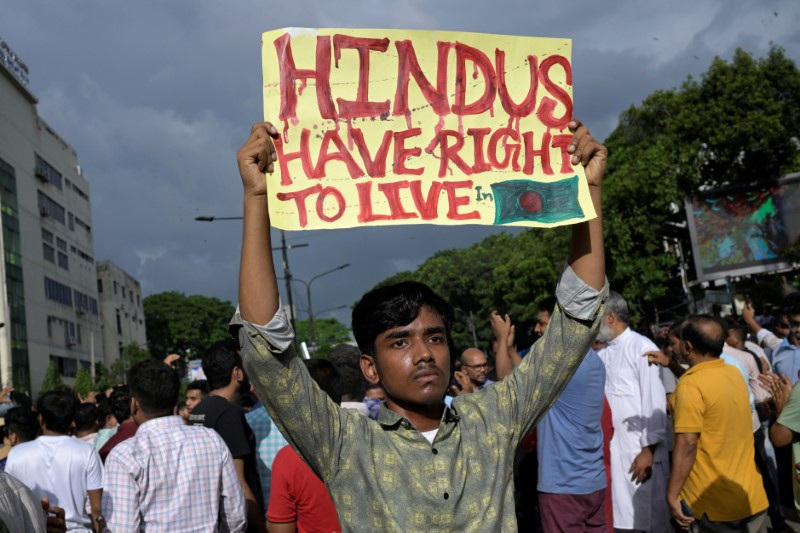Shouted slogans such as “Save the Hindus”; “Why are my temples and homes being looted? We want answers”
 KRC TIMES Desk
KRC TIMES Desk

DHAKA : Two days after Bangladesh’s interim government took charge, the country saw significant developments, including the country’s top judge resigning on Saturday following an ultimatum from protesters.
Additionally, Hindu minorities protested attacks against them and called for their right to safety and coexistence, while concerns grew over Chinese surveillance near the Bay of Bengal.
“The way things are at present in Bangladesh, where three major powers of the world have confluenced to put things in order, there is nothing but chaos around. China has deployed three ships in the Indian Ocean, near the Bay of Bengal. We are rudderless, literally,” Professor Nazmul Ahsan Kalimullah, a political commentator in Bangladesh, told .
On Saturday, Bangladesh’s Chief Justice, Obaidul Hassan, along with five Appellate judges, resigned “in principle” following an ultimatum from protesters, who threatened to besiege the residences of the Chief Justice and the Appellate Division judges if their demands were not met.
The resignations occurred amid fears that the judges were planning a meeting to declare the new interim government unconstitutional.
Justice Syed Refaat Ahmed, the senior-most judge of the High Court Division of the Supreme Court, was initially appointed as a judge of the Appellate Division before being elevated to the position of Chief Justice.
Similarly, ASM Maksud Kamal resigned from his position as vice-chancellor of Dhaka University, citing “personal reasons” after being asked to step down by the protesters. According to local media reports, Kamal submitted his resignation letter to the education ministry following a conversation with an advisor to the interim government.
Meanwhile, Hindus in the country gathered in the Shahbag area of Dhaka, seeking protection for themselves and their places of worship, with some chanting religious slogans.
They shouted slogans such as “Save the Hindus”; “Why are my temples and homes being looted? We want answers”; “Hindu persecution in independent Bangladesh will not continue”; “Religion is for individuals, the state is for everyone”; and “Ensure the safety of Hindus.”
They also demanded the establishment of a ministry for minorities and the allocation of 10 percent of parliamentary seats to them.
Similarly, thousands of Hindus assembled near the Sitalkuchi border, requesting the Indian BSF to either allow them to cross or at least accept women and children, citing their vulnerability.
Since the fall of the Hasina-led government on August 5, members of minority communities in Bangladesh have reported at least 205 attacks across 52 districts, according to the Bangladesh Hindu Buddhist Christian Unity Council and the Bangladesh Puja Udjapan Parishad.
Meanwhile, Bangladesh’s interim leader Muhammad Yunus condemned attacks on minority communities, calling the acts “heinous” and urging the youth to protect all Hindu, Christian, and Buddhist families from harm.
“Are they not the people of this country? You have been able to save the country; can’t you save some families?… You must say that no one can harm them. They are my brothers; we fought together, and we will stay together,” he asserted, underscoring the need for national unity.
Even as Dhaka slowly limps back to normalcy, police forces remain on strike, prompting the Army to enlist National Cadet Corps (NCC) cadets and student protesters to manage traffic on the roads.
Notably, dozens of police officers were killed during the protests and violence leading up to Hasina’s removal, leading police unions to declare a national strike on Tuesday until the security of officers is assured.



